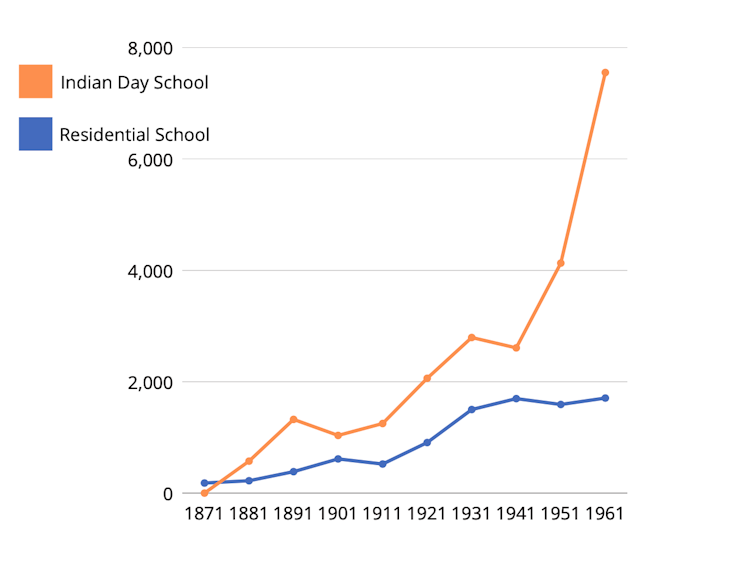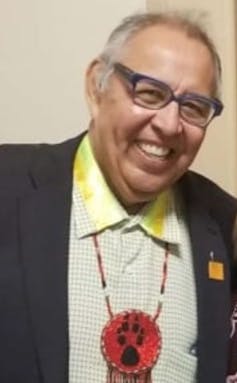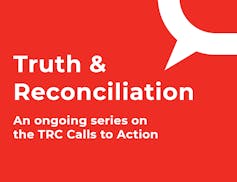Indian day school survivors are seeking truth and justice
October 27, 2020
Share
In January 2020, Canada began emerging from a . This landmark settlement has been embroiled by as well as . In the meantime, survivors and the public have yet to learn how the .
An estimated 200,000 Indigenous children were forced to attend that operated on First Nations reserves in every Canadian province from the mid-1800s until 2000. While the government of , .
We have collaborated on a new historical biography, . The perspectives we bring are as an Indian day school survivor and activist (Raymond), author of this book, a mixed settler-Anishinaabe historian (Jackson) and a white settler scholar of education (Theodore), the bookÔÇÖs editors.
As historians of education, we believe that Canada must continue to come to grips with the full extent of its past. Schools and curricula are a part of this past, as well as the present and the future. They also laid the historical foundation of .

Forced attendance, abuse
Since the official submission date for claims opened in January 2020, survivors have been written application of documenting their trauma and abuse.
While the settlement covers the costs for survivors to file a claim with the designated legal counsel, . In June of this year, survivors also learned that they .
Survivors who submit an application are entitled to a minimum for ÔÇ£harms associated with attendanceÔÇØ at one of the 699 recognized schools.

This does not include the approximately . Former students who were physically or sexually abused could receive
This federal settlement was reached after extensive advocacy work by survivors.
Survivor , with Raymond, approached lawyers . After extensive negotiations with the federal government, there was an . After additional negotiations, the final settlement worth was announced in .
SurvivorsÔÇÖ work has opened up processes of legal acknowledgement of wrongdoing and thus made possible a form of justice and compensation. As of Sept. 30, 2020, .
National inquiry into day schools
It has been over five years since the Truth and Reconciliation Commission (TRC) presented their findings in a report and in . Since that time, ongoing injustices towards Indigenous people have led some to . Yet the truth that was uncovered through oral testimony and historical research as part of the TRC has provided valuable knowledge to those who are listening.
Numerous departments , and have begun incorporating the history of Indian residential schools into their curricula.
This process of seeking the truth is unfortunately not happening for Indian day schools survivors, despite who are passing away every year. It is time for a national inquiry into the history of Indian day schools and their ongoing legacy for the education of Indigenous students in Canada.
Helen Raptis, who has studied the history of Indian day schools in , has argued that our understanding of Indigenous education ÔÇ£has been hampered by historiansÔÇÖ almost singular focus on residential schooling.ÔÇØ This is despite .
Abuse, forced to abandon language
When the federal government, plaintiffs and lawyers announced the day schools agreement in principle in December 2018, Minister of Crown-Indigenous Relations Carolyn Bennett, acknowledged:
ÔÇ£As a result of the . Survivors across this country continue to suffer from the abuse and horrific experiences they were subjected to, which were perpetuated by the very people charged with educating them as children.ÔÇØ
Since this announcement, neither the government nor any of the religious organizations involved, have launched a national inquiry or issued a formal apology. If the federal government and church organizations are unwilling to support an investigation into the full extent of survivorsÔÇÖ accounts , then historians and the general public must make it a priority to .
Indian day school survivors and their descendants have already begun sharing their schooling experiences. Through organizing and sharing information about their claims and experiences on a growing Facebook group and articles by journalists such as , their stories are slowly becoming heard. The nearly offers mentors, guidance and a supportive community for survivors. This virtual place has become a primary source of information for claimants.
Mapping Indian day schools
From the perspective of survivors, such private forums are critical. However, they cannot replace , for future generations of survivorsÔÇÖ descendants, historians and the general public.
In research at QueenÔÇÖs University, we are now working towards a map-making project that will provide an online resource that visualizes the location of all Indian day schools and describes what archival files are available.
In addition to this, we invite Indian day school survivors to participate in a study that seeks to learn about their experiences through questions such as: What did you experience in OntarioÔÇÖs Indian day school? How did these experiences impact you later in life? What would you like to be remembered about the Indian day schools?
These questions are only small steps towards a wider goal of providing an option for Indian day school survivors to tell their history without the interference of the government, lawyers or a claims administrator. The oral history from survivors will play an essential role in the memory of these events as evidenced from the testimonies of .

Urgent response required
There is an urgent need to document history related to the day schools, and also to commit to holding Canada accountable for systemic injustices that continue to .
Sen. Murray Sinclair, who chaired the TRC, has criticized the way the federal government has handled records related to residential schoolsÔÇÖ survivorsÔÇÖ accounts. In June, he noted:
ÔÇ£.ÔÇØ
This is despite the TRCÔÇÖs call for a national review of archival policies. An ongoing battle over the and .
We believe that all Canadians must join with survivors in demanding transparent processes in the Indian day school settlement. This would involve funds being available to the legacy fund for the support of healing and education.
Seeking truth in history should begin with study of our educational systems. These embed our values and beliefs. The Indian day schools are a part of CanadaÔÇÖs history and directly affect every Canadian, not only those who survived them.![]()
____________________________________________________________________________
, PhD Candidate, Indigenous education, ; , Community research partner, Peguis First Nation, and , Professor, Social Studies and History Education,
This article is republished from under a Creative Commons license. Read the .